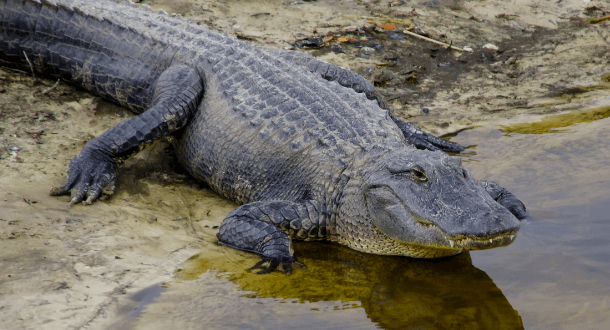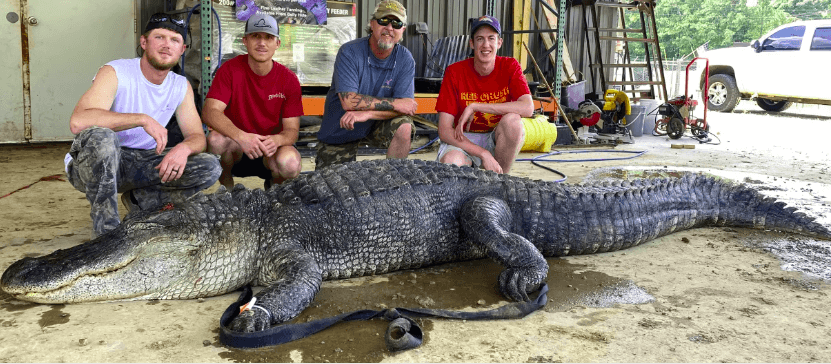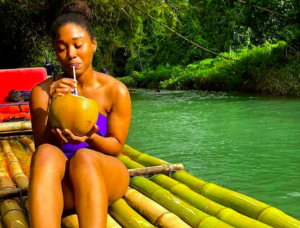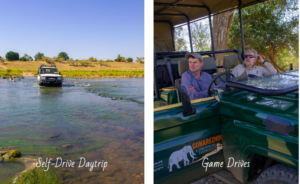
Alligator hunting in Mississippi is an exciting and strictly controlled activity that provides outdoor lovers with a once-in-a-lifetime opportunity to interact with these ancient reptiles. The Mississippi Department of Wildlife, Fisheries, and Parks (MDWFP) has set certain seasons and rules for alligator hunting in order to protect the sustainability of the alligator population and promote safe hunting practises.
For those prepared to face the wilds of the Magnolia State, this adventurous pursuit combines the excitement of the hunt with the mysticism of the marshes, providing a singular and unforgettable experience. Texas, Florida, Georgia are popular destinations for Alligator hunting.
Join us as we go through Mississippi’s top alligator hunting regions, which feature murky rivers and dense vegetation. We’ll dig into the background, rules, and methods that make this trip a unique outdoor outing in this fascinating inquiry. Alligator Hunting in Mississippi is a monument to the tenacity of hunter and prey in the heart of the Deep South.
How To Hunt Alligator In Mississippi Full Guide.
Hunting alligators in Mississippi is an exciting adventure, but it’s vital to remember that it’s a highly regulated sport with strict laws and regulations. Here’s a thorough guide on alligator hunting in Mississippi:
1-Get a Permit:
Obtaining a hunting licence is the first step in alligator hunting. The Mississippi Department of Wildlife, Fisheries, and Parks (MDWFP) normally issues permits using a lottery method.
The permit lottery application period and deadlines may vary from year to year, so check the MDWFP website or contact them directly for the most up-to-date information.
2-Understand the Regulations:
Familiarise oneself with the current hunting restrictions, including season dates, bag limits, size limits, and any zone-specific rules.
Regulations differ by hunting zone, so it’s critical to understand the laws in your region.
3-Gather Equipment:
Prepare your hunting gear, which may include spotlights, baited hooks, harpoons, and weapons (if permitted in your area).
Check that your equipment is in excellent operating order and that it complies with state standards.
4-Scouting and researching:
Explore the location where you intend to hunt. It is critical to understand the geography, rivers, and alligator behaviours.
During the day, scout the hunting area for alligator activity and appropriate hunting places.
5-Safety Precautions:
Hunting for alligators may be deadly. Always put safety first.
Make sure you have a strong boat with enough lights, safety equipment, and communication gadgets.
To increase safety, work in pairs or groups.
6-Methods of Hunting:
Mississippi permits a variety of hunting tactics, including:
- Spotlighting: At night, use a powerful flashlight to identify alligator eyeballs.
- Baited Hooks: To catch alligators, use baited lines with treble hooks.
- Harpooning: When alligators surface, harpoon them.
- Be aware of any special hunting rules in your area.
7-Size and Bag Restrictions:
Keep in mind the size restrictions for collected alligators in your area. Alligators that are too little or too large must be freed.
Before collecting the alligator, make sure you accurately measure it.
8-Tagging and harvesting:
When you have successfully captured an alligator, immediately fasten the given tag on it.
Report your harvest to the MDWFP within the time limit indicated.
9-Hunting Ethics and Responsibility:
Hunt ethically and responsibly, according to all applicable rules and regulations.
Respect the environment and the creatures that you are after.
10-Post-Hunt:
Handle and treat the collected alligator properly, ensuring that all components are used or disposed of appropriately.
Share your experiences and data with the MDWFP to help control the alligator population.
11- Hire a Guide (Optional):
If you’re new to alligator hunting or unfamiliar with the area, consider hiring an experienced hunting guide who knows the regulations and techniques specific to Mississippi.
Always remember that alligator hunting is highly regulated, and compliance with the law is essential. Stay informed about the latest rules and guidelines provided by the MDWFP, and ensure that your hunting experience is both safe and responsible while respecting the environment and the alligator population.
Best Mississippi Hunting Zones

Pearl River Zone:
This zone includes the Pearl River and its associated marshes and backwaters.
To maintain the alligator population in this zone, certain laws have been implemented.
Pascagoula River Zone:
The Pascagoula River Zone contains the Pascagoula River as well as the marshes and wetlands that surround it.
Regulations in this zone may be modified to the specific characteristics of this zone.
Ross Barnett Reservoir Zone:
This zone, located north of Jackson surrounding the Ross Barnett Reservoir, provides a unique alligator hunting experience in a different sort of environment.
Regulations are in place to properly regulate alligator numbers in this area.
Southwest Zone:
The Southwest Zone encompasses a wide range of landscapes in southwestern Mississippi, including bayous, rivers, and marshes.
It, like other zones, has its own set of rules.
Southeast Zone:
The Southeast Zone generally covers the marshes and rivers of southeastern Mississippi’s Gulf Coast.
Regulations in this zone may differ from those in others.
These are some of the most popular alligator hunting areas in Mississippi. Season dates, permit quotas, size limitations, and hunting tactics are all regulated differently in each zone. It is critical to check the MDWFP for the most up-to-date information on hunting zones and restrictions for the current hunting season before organising your alligator hunt.
Mississippi Alligator Hunting Season and Regulation
Season Structure:
In Mississippi, there is often an alligator hunting season every year, which typically occurs in the late summer or early fall.
The MDWFP chooses the precise dates for the season, which might change from year to year.
Tagging Requirements:
Every hunter is expected to secure a unique tag to each alligator that is taken. The MDWFP regulations must be followed while using the tags that come with the permission.
Hunting Methods and Hours:
The majority of alligator hunting takes place at night since alligators are more active during the chilly nighttime hours.
Spotlights, baited hooks, and harpoons are common hunting tools, however restrictions might differ by zone, so hunters must be conversant with the local regulations.
Size Restriction
To safeguard the population, Mississippi imposes size restrictions on alligators that are harvested. Hunting enthusiasts must verify the most recent rules because size restrictions might change from year to year and by zone.
Data Gathering and Reporting
Successful hunters must provide their catch to the MDWFP in order to aid in the data collection process for management and research reasons.
Alligator population monitoring and future hunting season planning are made easier with the use of this data by scientists.
Safety measures:
Participants should always put safety first since alligator hunting may be deadly. This entails possessing the required tools, being familiar about alligator habits and behaviour, and cooperating with others for increased safety.
Moral Hunting Techniques:
To reduce stress on the alligator population and preserve the integrity of this special outdoor pastime, responsible and ethical hunting techniques are actively encouraged.
In Mississippi, alligator hunting is an exciting and difficult activity that has a long history and cultural significance. Hunters may aid in the preservation of this rare species and have a wonderful experience in the heart of the Deep South by following the rules and restrictions established by the MDWFP.
What is the easiest state for alligator hunting?
The “easiest” state for alligator hunting is subjective and relies on a number of criteria, including rules, accessibility, and the overall hunting experience you desire. Alligator hunting is controlled in all jurisdictions where it is legal, and acquiring licences can be difficult due to restricted quantities and strong demand. Here are a few alligator hunting states, each with its unique set of considerations:
Florida:
With one of the greatest alligator populations in the United States, Florida is well-known for its alligator hunting prospects.
The state provides hunting opportunities on both public and private territory.
Although the permit application procedure is tough, there are several options accessible.
Louisiana:
Louisiana has a long history of alligator hunting, and the state issues a large number of permits each year.
There are hunting chances on both public and private land.
Louisiana’s wetlands and bayous offer a one-of-a-kind alligator hunting experience.
Mississippi:
Mississippi also has alligator hunting, with various hunting zones and laws.
In Mississippi, the permission procedure is primarily based on a lottery method, with the amount of permits varying by year and zone.
Texas:
Alligator hunting is permitted in select sections of Texas, notably the state’s southern region.
The availability of permits and hunting laws varies by location.
South Carolina (SC):
A lottery mechanism is used in South Carolina to provide public alligator hunting chances.
The state has particular standards regarding alligator hunting and reporting.
It’s critical to note that alligator hunting in each state comes with its own set of laws, restrictions, and permission requirements. Furthermore, what is deemed “easiest” might vary based on your degree of skill, access to hunting grounds, and willingness to negotiate the permission procedure.
FAQs About Mississippi Alligator Hunting.
Are there specific hunting zones for alligator hunting in Mississippi?
Yes, Mississippi is separated into hunting zones, each with its own set of rules and restrictions. The number of licences issued and the size limitations varies by zone.
Can non-Mississippi residents hunt alligators in the state?
Non-residents can, in most cases, apply for alligator hunting licences in Mississippi. They may, however, have distinct quotas or be subject to various laws. For special non-resident needs, contact the MDWFP.
When is the ideal time of day to go alligator hunting in Mississippi?
Because alligators are more active in the cooler nighttime temps, most alligator hunting takes place at night. Most hunters go out after dusk and stay into the early morning hours.
What should I do if I come across a little or large alligator?
If you come across an alligator that is too little to be harvested in your area, you must release it quickly and unharmed. Follow alligator handling and release restrictions.
Is a valid Mississippi hunting licence required in addition to an alligator hunting permit?
Even if you obtain an alligator hunting permit, alligator hunters in Mississippi must have a valid Mississippi hunting licence. Check the particular regulations for any modifications or exceptions.
Is it legal to sell or exchange alligator flesh, skins, or components obtained during the hunt?
It is critical to understand the laws governing the sale and exchange of alligator items. Without the right permissions and documents, it is sometimes unlawful to sell or exchange alligator flesh, skins, or parts. Specific rules should be checked with the MDWFP.
Is special training or certification required to hunt alligators in Mississippi?
While there are no formal training or certification requirements, alligator hunters should educate themselves about alligator behaviour, safe hunting practises, and state legislation before beginning on a hunt.
Is it illegal to hunt alligators near residential areas or public roads?
Yes, hunting alligators near residential areas and public roadways is frequently restricted in order to guarantee public safety. Keep an eye out for no-hunting zones and stick to the specified hunting grounds.
Related






